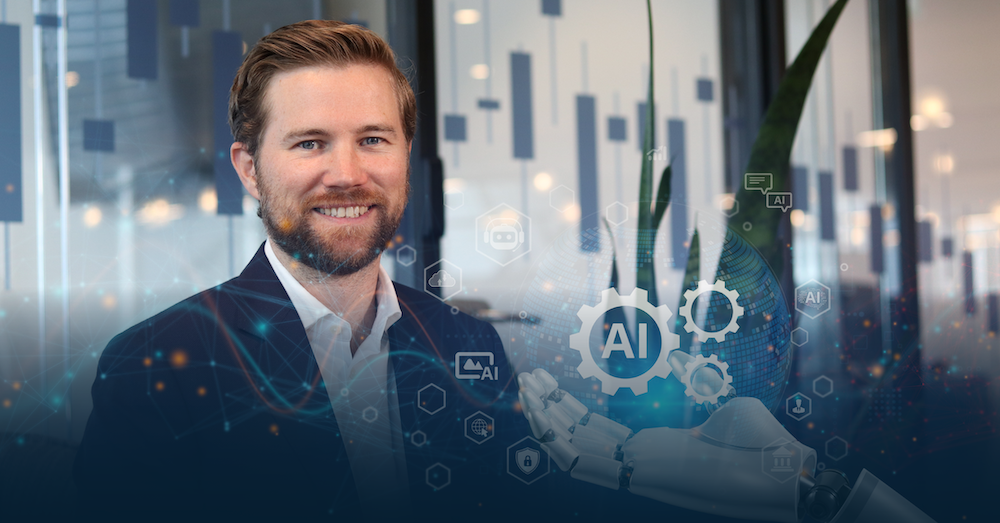NEWS
28/12/2023
The Future of AI with Andy Biggs

As we approach 2024, we asked Andy Biggs, Finalto’s Group Head of Risk and Trading, to explore the dominant trends shaping finance and the wider working world, with a particular focus on the burgeoning role of AI, particularly large language models like ChatGPT. Our discussion aims to unearth how these technologies are reshaping industries and what this means for the future.
What do you see as the main influencing trends moving into 2024?
“I think it’s hard to talk about big trends for next year, especially when it comes to technology, without talking about AI; especially with large language models hitting the mainstream with the likes of ChatGPT taking off in the way that it has. It’s been super interesting to see this powerful technology being more and more widely leveraged across Finalto, and I assume most other companies as well.
Marketing is obviously an area where it is most immediately tailored for the technology right now, but things like client services, compliance, and even on the development side are going to become more and more commonplace in the coming years. AI for code completion and software development open up whole new realms for people with no computer science or programming background which is very exciting.”
What do you see as the role of AI in the workplace of 2024?
“In short; AI in its current state is exceptionally good solving small chunks of problems to speed up work. These tools, like ChatGPT, which are available to everyone – they just make life a lot easier. It doesn’t matter how educated or experienced you are, you will never be as well-read as ChatGPT. While AI isn’t currently as intelligent as an expert in any given field, having access to that encyclopaedic processing of information makes creating actionable and intelligent insights on the back of that information, vastly more efficient.
To answer your question more directly, any task that requires processing a lot of information, I think it’s only sensible to leverage AI. It can alleviate the strain of complex tasks and give people more scope to focus on the bigger picture. If there is a large body of data that needs interpreting, then I don’t see any reason why AI shouldn’t be taken advantage of so long as we are conscious of the potential risks involved.”
What are those risks? What checks and balances do you think need to be in place to use this technology responsibly?
“I think ‘Garbage in, garbage out’ is still very much at play when you are talking about algorithms of any kind. it’s incredibly important that you provide kind of the right data and properly evaluate the outputs you’re getting; never taking them at face value. You could have the most advanced machine learning and artificial intelligence algorithms in the world, but if you don’t have access to the right datasets or people who would be able to perform the task without AI, then you’re always going to be putting out fires.
The biggest risk I see with AI is people becoming complacent about its capabilities; there is always the potential for inconsistencies or even completely fabricated results if the algorithm misinterprets data. I am all for the use of AI in the workplace, but if a prompt is not analysed for mistakes or the end product is not challenged for errors – that’s when I’d start to be unhappy.”
Do you see a near future where AI is replacing the need for industry professionals completely?
“I think one of the key things with AI right now is that it certainly gives you *an* original answer – but whether that answer is an accurate or intelligent one is not something that can be assessed by anyone except someone with a deep knowledge of the field being queried.
You know, algorithmic trading and algorithmic risk analysis are not novel ideas – people have been trying to find ways to digitally automate the markets and their businesses since the 1980s. Although the technology has become exponentially more advanced since then I think there are still a lessons to be taken away from those decades of experience – taking your hands off the wheel for too long always results in a crash. So, I suppose the silver lining for industry professionals is I don’t think human expertise will be out the window any time soon. However, one thing I will say is that with such huge productivity gains, the number of professionals needed in a business may be significantly reduced; a task that may take a whole team hours to complete can now be done by a single employee in half that time. I think what’s coming next is a leaner, meaner, more competitive landscape for businesses pretty much across the board – but good people will always be in high demand.”
Related News & Events

Finalto Secures UAE SCA Category 5 Licence

After the Transatlantic Consensus: Rewriting the Trade Rule Book

Copper price hits record highs amid supply concerns

